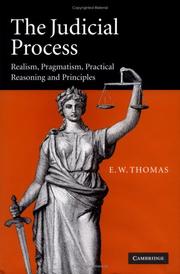| Listing 1 - 10 of 221 | << page >> |
Sort by
|
Book
ISBN: 0585348812 0300173350 9780585348810 Year: 1949 Publisher: New Haven : Yale University Press,
Abstract | Keywords | Export | Availability | Bookmark
 Loading...
Loading...Choose an application
- Reference Manager
- EndNote
- RefWorks (Direct export to RefWorks)
Judicial process. --- Decision making, Judicial --- Judicial behavior --- Judicial decision making --- Judges --- Law --- Procedure (Law) --- Psychological aspects --- Interpretation and construction
Book

ISBN: 2247187641 Year: 2018 Publisher: Paris : Dalloz,
Abstract | Keywords | Export | Availability | Bookmark
 Loading...
Loading...Choose an application
- Reference Manager
- EndNote
- RefWorks (Direct export to RefWorks)
Présentation de l'éditeur : "C'est un sujet vertigineux que celui de la justice prédictive. D'un certain côté, c'est une promesse de sécurité et de certitude qui est rassurante face à ce qu'il est d'usage d'appeler « l'aléa judiciaire ». Mais d'un autre côté, la perspective de remplacer l'homme par une machine est forcément angoissante, et constitue peut-être la négation même de la justice. Pour célébrer son bicentenaire, l'Ordre des avocats au Conseil d'État et à la Cour de cassation a rassemblé des magistrats de ces deux hautes juridictions, des universitaires, des avocats aux Conseils et des praticiens du numérique pour réfléchir à cette redoutable question. Dans cet ouvrage qui rassemble leurs contributions, chacun expose, au terme d'analyses approfondies, ses doutes et ses espoirs, ses craintes et ses convictions, et tente de définir, face au progrès technique, la part irréductible d'humanité qui doit demeurer au coeur de la justice"
Judicial process --- Decision making, Judicial --- Judicial behavior --- Judicial decision making --- Judges --- Law --- Procedure (Law) --- Psychological aspects --- Interpretation and construction
Book
ISBN: 019060235X 0190233516 0190233508 Year: 2016 Publisher: New York, NY : Oxford University Press,
Abstract | Keywords | Export | Availability | Bookmark
 Loading...
Loading...Choose an application
- Reference Manager
- EndNote
- RefWorks (Direct export to RefWorks)
The rule of law paradigm has long operated on the premise that independent judges disregard extralegal influences and impartially uphold the law. A political transformation several generations in the making, however, has imperiled this premise. Social science learning, the lessons of which have been widely internalized by court critics and the general public, has shown that judicial decision-making is subject to ideological and other extralegal influences. In recent decades, challenges to the assumptions underlying the rule of law paradigm have proliferated across a growing array of venues, as critics agitate for greater political control of judges and courts. With the future of the rule of law paradigm in jeopardy, this book proposes a new way of looking at how judicial decision-making should be conceptualized and regulated.
Political questions and judicial power --- Judicial process --- Political aspects --- Decision making, Judicial --- Judicial behavior --- Judicial decision making --- Judges --- Law --- Procedure (Law) --- Psychological aspects --- Interpretation and construction

ISBN: 9780521066884 9780511493768 9780521855662 0511493762 9780511130786 0511130783 0521855667 0511129254 9780511129254 0521855667 1280416467 9781280416460 1107155428 9781107155428 0511182724 9780511182723 0511300883 9780511300882 0521066883 051120048X Year: 2005 Publisher: Cambridge Cambridge University Press
Abstract | Keywords | Export | Availability | Bookmark
 Loading...
Loading...Choose an application
- Reference Manager
- EndNote
- RefWorks (Direct export to RefWorks)
In the absence of a sound conception of the judicial role, judges at present can be said to be 'muddling along'. They disown the declaratory theory of law but continue to behave and think as if it had not been discredited. Much judicial reasoning still exhibits an unquestioning acceptance of positivism and a 'rulish' predisposition. Formalistic thinking continues to exert a perverse influence on the legal process. This 2005 book dismantles these outdated theories and seeks to bridge the gap between legal theory and judicial practice. The author propounds a coherent and comprehensive judicial methodology for modern times. Founded on the truism that the law exists to serve society, and adopting the twin criteria of justice and contemporaneity with the times, a judicial methodology is developed which is realistic and pragmatic and which embraces a revised conception of practical reasoning, including in that conception a critical role for legal principles.
Judicial process. --- Decision making, Judicial --- Judicial behavior --- Judicial decision making --- Judges --- Law --- Procedure (Law) --- Psychological aspects --- Interpretation and construction --- Judicial process --- General and Others
Book
ISBN: 0674038193 9780674038196 9780674031319 0674264231 Year: 2009 Publisher: Cambridge, MA
Abstract | Keywords | Export | Availability | Bookmark
 Loading...
Loading...Choose an application
- Reference Manager
- EndNote
- RefWorks (Direct export to RefWorks)
Philip Hamburger's Law and Judicial Duty traces the early history of what is today called "judicial review." The book sheds new light on a host of misunderstood problems, including intent, the status of foreign and international law, the cases and controversies requirement, and the authority of judicial precedent. The book is essential reading for anyone concerned about the proper role of the judiciary.
Judicial review --- Judicial process --- Constitutional law --- Decision making, Judicial --- Judicial behavior --- Judicial decision making --- Judges --- Law --- Procedure (Law) --- History. --- Psychological aspects --- Interpretation and construction
Book
ISBN: 9781138812994 1138812994 9781138103740 9781315748450 9781317606109 9781317606116 Year: 2016 Publisher: Milton Park, Abingdon, Oxon ; New York, NY : Routledge,
Abstract | Keywords | Export | Availability | Bookmark
 Loading...
Loading...Choose an application
- Reference Manager
- EndNote
- RefWorks (Direct export to RefWorks)
Proportionality in law --- Judicial process --- Decision making, Judicial --- Judicial behavior --- Judicial decision making --- Judges --- Law --- Procedure (Law) --- Psychological aspects --- Interpretation and construction --- Proportionnalité (droit) --- Processus judiciaire --- Proportionnalité (droit)
Book
ISBN: 110835890X 1108359469 1108360580 1108361145 1108362826 1108339115 1108420494 1108430368 1108356109 Year: 2017 Publisher: Cambridge : Cambridge University Press,
Abstract | Keywords | Export | Availability | Bookmark
 Loading...
Loading...Choose an application
- Reference Manager
- EndNote
- RefWorks (Direct export to RefWorks)
Embedded Courts is laden with tension. Chinese courts are organized as a singular and unified system yet grassroots courts in urban and rural regions differ greatly in the way they use the law and are as diverse as the populations they serve. Based on extensive fieldwork and in-depth interviews, this book offers a penetrating discussion of the operation of Chinese courts. It explains how Chinese judges rule and how the law is not the only script they follow - political, administrative, social and economic factors all influence verdicts. This landmark work will revise our understanding of the role of law in China - one that cannot be easily understood through the standard lens of judicial independence and separation of powers. Ng and He make clear the struggle facing frontline judges as they bridge the gap between a rule-based application of law and an instrumentalist view that prioritizes stability maintenance.
Judicial process --- Courts --- Justice, Administration of --- Decision making, Judicial --- Judicial behavior --- Judicial decision making --- Judges --- Law --- Procedure (Law) --- Psychological aspects --- Interpretation and construction
Book
ISBN: 9004442847 9004442766 Year: 2020 Publisher: Leiden ; Boston : BRILL,
Abstract | Keywords | Export | Availability | Bookmark
 Loading...
Loading...Choose an application
- Reference Manager
- EndNote
- RefWorks (Direct export to RefWorks)
In Justice in Print: Discovering Prefectural Judges and Their Judicial Consistency in Late-Ming Casebooks , Ka-chai Tam argues that the prefectural judge in the judiciary of the Ming dynasty (1368-1644) became crucial to upholding justice in Chinese society. In light of two late Ming casebooks, namely the Mengshui zhai cundu by Yan Junyan and the Zheyu xinyu by Li Qing, Ka-chai Tam demonstrates that the late Ming judges handled their cases with a high level of consistency in judicial reasoning and practice in every type of case, despite their differing regions and literary styles. Equipped with relative institutional independence and growing professionalism, they played an indispensable role in checking and guaranteeing the legal performance of their subordinate magistrates.
Judicial process --- Justice, Administration of --- Decision making, Judicial --- Judicial behavior --- Judicial decision making --- Judges --- Law --- Procedure (Law) --- History. --- Psychological aspects --- Interpretation and construction --- China --- History
Book
ISBN: 1009049038 1009058932 1009058738 1009048856 Year: 2021 Publisher: Cambridge : Cambridge University Press,
Abstract | Keywords | Export | Availability | Bookmark
 Loading...
Loading...Choose an application
- Reference Manager
- EndNote
- RefWorks (Direct export to RefWorks)
The past decade has witnessed a worldwide explosion of work aimed at illuminating judicial-behavior: the choices judges make and the consequences of their choices. We focus on strategic accounts of judicial-behavior. As in other approaches to judging, preferences and institutions play a central role but strategic accounts are unique in one important respect: They draw attention to the interdependent - i.e., the strategic - nature of judicial decisions. On strategic accounts, judges do not make decisions in a vacuum, but rather attend to the preferences and likely actions of other actors, including their colleagues, superiors, politicians, and the public. We survey the major methodological approaches for conducting strategic analysis and consider how scholars have used them to provide insight into the effect of internal and external actors on the judges' choices. As far as these studies have traveled in illuminating judicial-behavior, many opportunities for forward movement remain. We flag four in the conclusion.
Judicial process --- Statistical methods. --- Decision making, Judicial --- Judicial behavior --- Judicial decision making --- Judges --- Law --- Procedure (Law) --- Psychological aspects --- Interpretation and construction

ISBN: 227501859X Year: 2000 Publisher: Paris : LGDJ (Librairie Générale de Droit et de Jurisprudence),
Abstract | Keywords | Export | Availability | Bookmark
 Loading...
Loading...Choose an application
- Reference Manager
- EndNote
- RefWorks (Direct export to RefWorks)
Judgments --- -Judicial process --- 347.9 <44> --- Decision making, Judicial --- Judicial behavior --- Judicial decision making --- Judges --- Law --- Procedure (Law) --- Court decisions --- Court rulings --- Civil procedure --- Courts --- Criminal procedure --- Estoppel --- Judicial process --- Jurisdiction --- Stare decisis --- Methodology --- Psychological aspects --- Interpretation and construction
| Listing 1 - 10 of 221 | << page >> |
Sort by
|

 Search
Search Feedback
Feedback About UniCat
About UniCat  Help
Help News
News